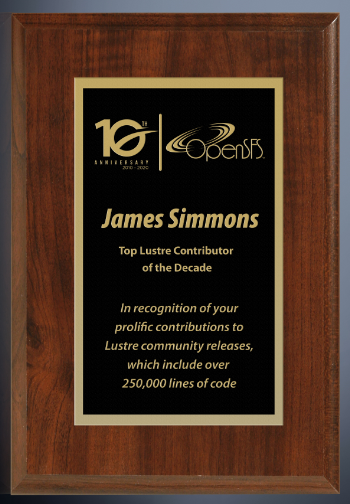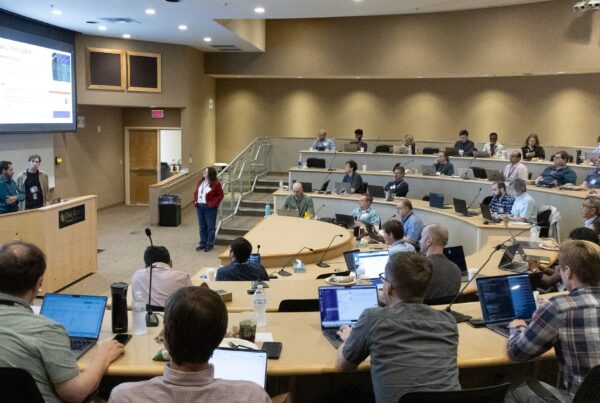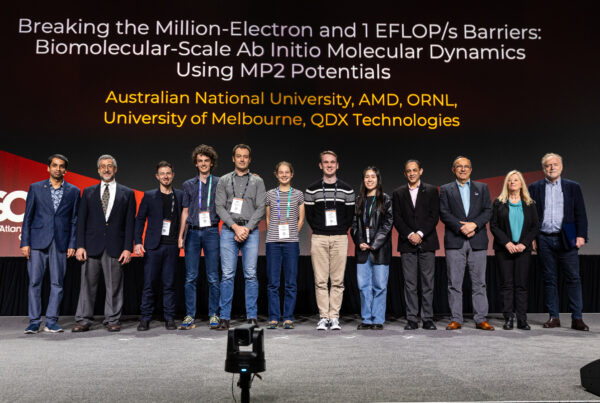
James Simmons has contributed to the Lustre code base for ten years, contributing more than 250,000 lines of code to benefit the entire Lustre community.
The National Center for Computational Sciences’ (NCCS’s) James Simmons was recognized by the Open Scalable File Systems, Inc. (OpenSFS) organization at the virtual user meeting on September 9 as the top Lustre contributor of the decade for his prolific contributions to the Lustre file system software, which have included more than 250,000 lines of code.
Generally used for high-performance computing (HPC) systems, Lustre has been employed in many of the Oak Ridge Leadership Computing Facility’s (OLCF’s) previous file systems at NCCS, including the shared file system used by the Jaguar and Titan supercomputers. It is currently used by the current Gaia system owned by the National Oceanic and Atmospheric Administration and the US Air Force Weather system owned by the US Air Force, both housed at the NCCS. The OLCF is a US Department of Energy (DOE) Office of Science User Facility at DOE’s Oak Ridge National Laboratory (ORNL).
“James Simmons has been tireless in his work to better the Lustre code base,” said Stephen Simms, manager of high-performance file systems at Indiana University and the president of OpenSFS. “No single person has made such a voluminous contribution. For this, his wit, and his good nature, OpenSFS and the Lustre community are very grateful.”
Simmons’ contributions to Lustre began when he came to ORNL in 2008 to work in the NCCS’ Technology Integration Group (TechInt). Initially, his job was to evaluate the Lustre software stack and determine where improvements could be made. But soon, he began fixing issues himself and submitting those fixes to the Lustre community.
“I can’t stand broken things,” Simmons said. “Being able to analyze and debug issues on our large-sale file systems is a unique opportunity, so it’s nice to be able to contribute that back to the community.”
OpenSFS is the nonprofit community organization dedicated to the success of the Lustre® file system. OpenSFS was founded in 2010 to advance Lustre development, ensuring it remains vendor neutral, open, and free. ORNL is a founding member of OpenSFS.
Lustre is an open-source parallel file system technology that supports the requirements of leadership-class HPC resources, such as those at NCCS, and the Enterprise environments worldwide, such as Amazon Web Services. Lustre scales to tens of thousands of clients and hundreds of petabytes of storage. It has demonstrated over a terabyte per second of sustained I/O bandwidth. Many of the largest and most powerful supercomputers in the world are powered by the Lustre file system, including over 60 percent of the TOP500 sites—such as the world’s fastest, the Fugaku system in Japan—and the upcoming Frontier system, an exascale computing system to be housed at NCCS. Contributions to Lustre from the community, including the vendors and end users like NCCS, are pushed out to the community tree in new releases.
Lustre was originally developed on the Intel x86 architecture, but Simmons spearheaded the efforts to port Lustre on the IBM POWER and ARM architectures.
“James is making Lustre less vendor- and architecture-dependent so that it will have a wider community base and more longevity,” said Sarp Oral, group leader of TechInt. “James’ efforts in the Lustre domain have always had a big impact on our production systems and will continue to impact our future systems.”
The OLCF is slated to deliver Frontier as soon as next year—an exascale system that will feature Cray’s new Shasta architecture and Slingshot interconnect. Frontier’s Orion file system will be Lustre based; therefore, any changes to Lustre will benefit work performed on Frontier. Simmons’ contributions have also impacted other national laboratories and supercomputing centers, even ones outside the DOE space.
“We are providing a benefit to the entire Lustre community, which includes other DOE labs and other Lustre users entirely,” Oral said. “What James has done is different than other Lustre developers. He is the sole largest contributor to Lustre outside of one of the vendors, and that is something truly noteworthy.”
UT-Battelle LLC manages Oak Ridge National Laboratory for DOE’s Office of Science, the single largest supporter of basic research in the physical sciences in the United States. DOE’s Office of Science is working to address some of the most pressing challenges of our time. For more information, visit https://energy.gov/science.







